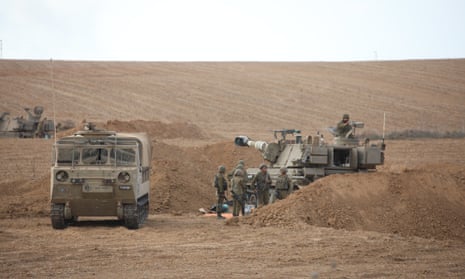Road 232, an Israeli highway, runs parallel to the blockaded Gaza Strip. It is surrounded by flat agricultural land in every direction, and from it the higher floors of the overcrowded enclave’s high rise buildings, are clearly visible, about 3 miles (5km) away.
Now, the route appears to have become the new de facto boundary between territory controlled by Israel and Hamas, the Islamist movement that launched a devastating surprise sea, land and air offensive on 20 neighbouring kibbutzim and Israeli towns last weekend. They slaughtered more than 1,000 people, and abducted dozens more to be used as bargaining chips. More than 830 people in Gaza have been killed in retaliatory Israeli airstrikes.
It is not just a new border: it is a new frontline. Early on Tuesday, four days into the fifth round of war since Hamas seized control of Gaza in 2007, the Israel Defence Forces (IDF) said that Israel’s perimeter with the strip had finally been secured.
Map
By midmorning, that was no longer the case: the boom and crump of airstrikes and artillery, along with the rattle of automatic gunfire, echoed across the empty fields. A convoy of Israeli tanks roared past, sending soil and dust metres up into the air. Two military helicopters hovered overhead and jumpy soldiers at checkpoints bristled at every distant movement. Huge plumes of black smoke rose above Gaza.
Kibbutz Re’im, off Road 232, is where 260 partygoers at an all-night rave were massacred at daybreak on Saturday. Survivors have told of playing dead next to bodies of their friends and watching women being raped before they were shot in the head, or tied up and burned. On the outskirts of the kibbutz, the bodies of Israelis have now all been removed.
How the Hamas attack on the Supernova festival in Israel unfoldedRead more
The only remains left on the sides of the road are the rotting cadavers of five men, stripped to their underwear, after being checked for explosives. All were surrounded by piles of clothing and military equipment bearing the green insignia of Hamas, and the white of Palestinian Islamic Jihad. Shot-up and abandoned cars bearing both Israeli and Palestinian licence plates were scattered up and down the highway.
In Sderot, a working-class town on the north-east corner of Gaza, the situation was not much better. Katry Kamenetski, 48, who moved to Israel from Moldova six years ago, never really liked the place. But after hiding in her apartment with her 23-year-old daughter for four days, watching the battle between gunmen who seized the police station over the road and Israeli forces, she was happy to get outside, even if air raid sirens meant ducking into public bomb shelters every so often.
“There were Israeli snipers on our roof, we could hear them. The electricity and water kept going off. We sat in the…
2023-10-10 12:55:23
Post from www.theguardian.com
rnrn
